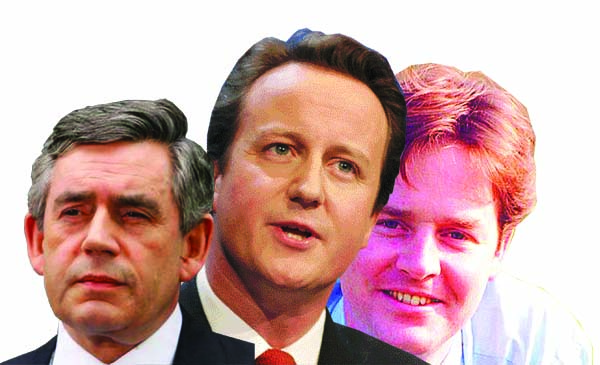
As the general election in the United Kingdom approaches, The Point Newspaper will make available to its esteemed readers the 2010 manifestos of the three main political parties, namely Labour, Conservatives and the Liberal Democrats. These parties are currently battling to form the next UK Parliament. However, the manifestos are voluminous and lengthy; thus the following are only summaries.
Labour Manifesto:
The incumbent party, Labour, in its manifesto, similar to the previous one, detailed its promise in all sectors of British society, ranging from the economy, health, education, immigration, policing, law and order and much more.
Economy - The Labour party popular in what analysts called 'proper management of the British economy' since it came to power is giving priority to the economy by making sure, among other economic strategies, that 'jobs are protected and the number in unemployment reduce drastically.' Thus, the Labour party vowed to keep the 'economy safe and to eliminate waste and getting value for money from the public sector for every pound spent.'
Labour said it will continue to help people who have lost their jobs get back into work, and that the 'Future Jobs Fund, worth £2 billion in 2009/10, will create 200,000 jobs.' This figure, of which at least 120,000 will be targeted at 18-24 year olds and 50,000 jobs will be targeted at unemployment hotspots.
The Labour manifesto recalled that when Britain was hit by the global recession, 'we faced a choice - we could let the recession run its course, as the Tories (main opposition party) had in the 1980s and 1990s, or we could actively intervene to support the economy, businesses and the family finances of the most hard-pressed.' Labour outlined that they decided, in line with the views of business leaders and economists, that "we had to act to prevent the collapse of our banking system."
Emphasising its record, Labour's manifesto said: 'We helped families with children by bringing forward increases in Child Benefit and Child Tax Credits, meaning that families receive increased payments for an extra four months.' On pensioners, Labour outlined that these category of people have benefited from the "largest increase in the state pension since 2001, as well as from increased pension credit and winter fuel payments. A reduction in VAT during the toughest period of the world recession, it said, also helped family budgets."
Labour said it would overhaul the way government runs by cutting back-office costs, getting rid of 'unnecessary quangos, and by sharply reducing consultancy fees and marketing expenditure.' The party in its manifesto also promises it will not only secure the current recovery by supporting the economy, but will also make sure that it will be halving the deficit by 2014 through growth, fair taxes and cuts to lower priority spending.
Labour also maintained in it manifesto that it will be introducing a global levy and reforming banking, as well as building a high-tech economy and modernising the British infrastructure.
Labour said it would continue to support the country?s business and industry to create one million more skilled jobs and will be creating the United Kingdom Finance for Growth. Under this, according to Labour, the party will be bringing £4 billion to provide capital for growing businesses and that there will be no stamp duty for first-time buyers on all house purchases below £250,000 for two years. This will be paid for by a five per cent rate on homes worth more than £1 million. Also, a National Minimum Wage rising at least in line with average earnings will be introduced to make sure that workers are fully protected.
Health - Labour in its manifesto also promised that the National Health Service (NHS), which it described as one of its 'greatest achievements' will be maintained and improved. It also said that the legally binding guarantees for patients, including the right to cancer test results within one week of referral, and a maximum 18 weeks? wait for treatment or the offer of going private will be achieved.
Also the preventative healthcare through routine check-ups for the over-40s has been promised, including a major expansion of diagnostic testing. Labour is also promising that the right to choose a GP in patients' own area which opens at evenings and weekends will be adhered to.
Education - Regarding education, which has been a mantra for the former Labour Prime Minister, Tony Blair, whose mandate the current incumbent is enjoying, the party indicated that every primary schoolchild in the country who for some reason requires a one-to-one tuition would receive it. Also under such a plan, called 'Labour plans and Teach First' - a scheme that recruits top graduates into teaching in secondary schools would be extended to posts at primary schools as well.
It also promises that where parents are unhappy with a school's performance, such parents would get the power to bring in new school leadership teams through 'mergers and takeovers.' Such policies include an expansion of free nursery places for two-year-olds and 15 hours a week of flexible, free nursery education for three and four-year-olds.
Labour says that every young person is guaranteed education or training until the age of 18, with 75 per cent going on to higher education, or completing an advanced apprenticeship or technician level training, by the age of 30.
Tax - Regarding its tax policies, Labour said it will raise the basic, higher and new top rates of tax, but added it is part of a plan to keep to fair tax increases while tackling the deficit. The Labour party also said it would not extend the application of VAT to various items such as food, children's clothes, books, newspapers and public transport fares, as this 'would hurt families on lower incomes.'
The Labour party particularly specifies a new Toddler Tax Credit of £4 a week from 2012. No stamp duty for first-time buyers on all house purchases below £250,000 for two years, paid for by a five per cent rate on homes worth more than £1 million. There will be more help for parents to balance work and family life, with a 'Father's Month' of flexible paid leave.
Environment - Regarding contentious issue about the environment, Labour also promises on the energy and climate-change policies that it will be achieving around 40 per cent low-carbon electricity by 2020. It will also be creating 400,000 new green jobs by 2015, and making greener living easier and fairer through 'pay as you save' home energy insulation.
Furthermore, on the environment, Labour said that it will make sure that there is an energy-bill discount for pensioners, and that it will be banning recyclable and biodegradable materials from landfills.
Transport - On the transport system, Labour said it will be building a new high-speed rail line linking the North and South of England, and will also improve commuter services and electrifying new rail lines. It will further be completing the east-west Crossrail line in London, as well as targeted motorway widening, including the M25.
Despite criticism from the Green Party and the prominent Green Peace and other pressure groups, Labour insisted it will be supporting a third runway for Heathrow Airport, but at the same time ensure that there are 100,000 electric vehicle charging points by end of the next Parliament.
Crime, Justice and Immigration - Labour also promises that it is determined to continue to crack down on crime, and that the party recognises that even though crime and anti-social behaviour is down, it is 'still a real issue in many areas.'
The party said that it also recognises that 'fear of crime and anti-social behaviour has not fallen as much as crime and anti-social behaviour itself.' That is why, according to Labour, it is 'protecting front line policing' and have introduced neighbourhood policing teams for every community in England and Wales, who are committed to spending 80 per cent of their time on the beat or visibly working in their community.
Labour defended certain issues described as 'controversial by commentators and critics, including CCTV operation and the storage of DNA.' Thus, the party said: "We will give the police the tools they need to fight crime, including DNA and CCTV. Without the DNA database, thousands of crimes would go unsolved and many serious and dangerous criminals would be walking our streets."
Elaborating on Immigration, Labour promises that immigration will be controlled through an 'Australian-style points-based system' which basically means to stop unskilled migration from outside the EU. It will also be asking all public sector employees who have contact with the public that they must possess an appropriate level of English language competence. English tests which are already in progress in certain quarters will be made compulsory for public sector migrant workers, according to Labour.
Equalities - Labour also believes that discrimination and inequality on the basis of race, gender, sexuality age, disability, religion or belief or social class has 'no place in the 21st century,' and thus it vowed that it will always be a champion for those whose 'rights need to be protected.'
Labour also recalled that it is the party that introduced the Racial and Religious Hatred Act which made it 'illegal to threaten people because of their religion or to stir up hatred against a person because of their faith.' It is vital to note that human rights groups and other anti-discrimination organizations and activists have congratulated Labour for such improvement.
Labour also added that it passed a range of laws which have 'supported women to better balance their work and family life and to tackle low pay.' Women in particular, according to the Labour manifesto, have benefitted from the minimum wage, and 'we have legislated for the right to request flexible working for parents with children aged 16 and under, and with disabled children under 18.'
Labour's manifesto also indicated that it has extended 'paid maternity leave to 9 months and maternity leave to 12 months, and given fathers the right to two weeks paid paternity leave. Helping families in this way helps mothers to balance work and family life helping to end the cycle of women being left behind in the workplace,' Labour said.
Foreign - As far as foreign policy is concerned, Labour maintained that it will continue to use 'Britain's international reach to build security and stability, as well as combating terrorism and extremism, curbing proliferation, preventing and resolving conflict, and tackling climate change.'
Labour said it will be re-energising the drive to achieve the Millennium Development Goals, supporting sustainable growth and combating poverty; reforming the UN, international financial institutions, the G8 and G20, and NATO to adapt to the new global challenges.
According to its manifesto, Labour promises it will also continue to lead the agenda for a European Union that delivers jobs, prosperity and global influence.
Constitutional reform - Labour admitted that the recent MPs debacle has provided a once in a generation opportunity for root and branch reform of Parliament and democracy. Therefore, Labour plans that there would be a referendum in October 2011 on changing the electoral system from 'first past the post' to a new 'alternative vote' for the House of Commons. It will also be having a fully elected and renamed House of Lords.
According to Labour, Parliament would have a 'free vote' on lowering the voting age to 16 and legislation would be passed to introduce fixed-term parliaments and further promises to restore trust in politics by giving voters the power to recall MPs found responsible for any 'financial and other misconduct.'
Police - The manifesto of Labour said that 'failing police forces could be taken over by more effective neighbouring forces' and, as a result, this could see 'chief constables and commanders sacked' for failing to meet required standards, and successful techniques shared to spread better policing around Britain.
Furthermore, police officers may also face more oversight and monitoring from outside, the sort of so-called bureaucracy that the rank and file complained is already interfering with their ability to operate effectively.
Council Tax - Labour said that there will be 'no council tax revaluation' in the next Parliament; however, a 'cross-party commission' will review the future of local government finance.
Technology - Labour also promises a nationwide broadband, 'eight-times faster than it can deliver' and also pledges to roll out broadband at a speed of 2 megabytes rather than megabits to virtually every house by 2012.
Meanwhile, a tense but friendly 90-minutes TV debate, dubbed the 'American style' between leaders of the three main political parties was found very interesting, as it once again resulted in another bone of contention in the various election polls. For example, the leader of the Liberal Democrats, Nick Clegg, is voted as the winner of the debate by several pundits and polls. In an ITV/ComRes survey, minutes after the debate, also put the Liberal Democrats up three points to 24 per cent, but still trailing Labour on 28 per cent and the Tories on 35 per cent.
This simply means that the Liberals took four points from the Conservatives; three from Labour and one from other parties in the poll, hence fortifying the conclusion of a likely hung Parliament in the UK.




